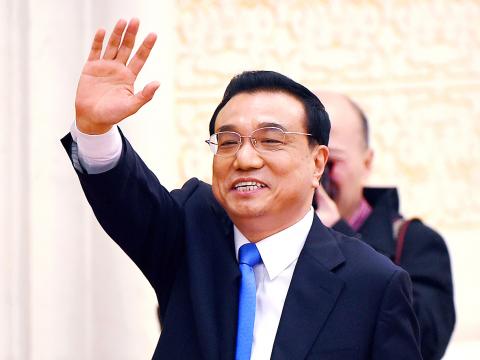At a news conference after the closing of China’s annual National People’s Congress legislative session in Beijing yesterday, Chinese Premier Li Keqiang (李克強) promised that China would prioritize Taiwan as Beijing opens to the world, and that it would continue to protect the interests of Taiwanese businesses in China.
“We will continue to protect the legitimate rights and interests of Taiwan-funded enterprises and Taiwan businesspeople on the mainland, and provide proper preferential policies to them,” Li said, when asked to comment on problems that Taiwanese businesses encounter in China.
To enhance cross-strait economic cooperation, Li said that “two wheels should be put in motion.”

Photo: AFP
“One is to enhance institution-building, for example, to continue to pursue follow-up talks on the Economic Cooperation Framework Agreement, and the other wheel is about further mutual opening-up,” he said.
However, Li said that such economic cooperation should be built on political foundations.
“People on both sides of the Taiwan Strait are members of one big family, as long as we continue to adhere to the ‘one China’ principle and the ‘1992 consensus,’ to oppose the Taiwan independence movement, and uphold peaceful development for cross-strait relations,” the premier said.
The so-called “1992 consensus,” a term former Mainland Affairs Council chairman Su Chi (蘇起) admitted he had fabricated in 2000, refers to a tacit understanding between the Chinese Nationalist Party (KMT) and Beijing that both sides of the Taiwan Strait acknowledge there is “one China,” with each side having its own interpretation.
Li also extended his invitation to young Taiwanese — who have drawn Beijing’s attention since the Sunflower movement last year — to start businesses in China.
“We welcome people from Taiwan businesses, particularly young people, to pursue their careers in the mainland, and enhance personnel exchanges,” Li said, which would help to “bring the hearts and minds of people on both sides of the Strait even closer to each other.”
The Mainland Affairs Council released a statement in response to Li’s remarks.
“The ‘1992 consensus,’ which allows both sides of the Taiwan Strait to make its own interpretation on ‘one China,’ is the foundation for institutionalized cross-strait interactions and exchanges,” the council said. “We call on China to face reality in cross-strait relations, fully understand Taiwanese people’s views and push for realistic, peaceful and stable developments between the two sides of the Taiwan Strait.”
The council also recognized China’s recent reform efforts, adding that it expects China to show its determination about the reforms — while allowing citizens to participate — to enhance life for people on both sides of the Strait, it added.

US President Donald Trump yesterday announced sweeping "reciprocal tariffs" on US trading partners, including a 32 percent tax on goods from Taiwan that is set to take effect on Wednesday. At a Rose Garden event, Trump declared a 10 percent baseline tax on imports from all countries, with the White House saying it would take effect on Saturday. Countries with larger trade surpluses with the US would face higher duties beginning on Wednesday, including Taiwan (32 percent), China (34 percent), Japan (24 percent), South Korea (25 percent), Vietnam (46 percent) and Thailand (36 percent). Canada and Mexico, the two largest US trading

AIR SUPPORT: The Ministry of National Defense thanked the US for the delivery, adding that it was an indicator of the White House’s commitment to the Taiwan Relations Act Deputy Minister of National Defense Po Horng-huei (柏鴻輝) and Representative to the US Alexander Yui on Friday attended a delivery ceremony for the first of Taiwan’s long-awaited 66 F-16C/D Block 70 jets at a Lockheed Martin Corp factory in Greenville, South Carolina. “We are so proud to be the global home of the F-16 and to support Taiwan’s air defense capabilities,” US Representative William Timmons wrote on X, alongside a photograph of Taiwanese and US officials at the event. The F-16C/D Block 70 jets Taiwan ordered have the same capabilities as aircraft that had been upgraded to F-16Vs. The batch of Lockheed Martin

GRIDLOCK: The National Fire Agency’s Special Search and Rescue team is on standby to travel to the countries to help out with the rescue effort A powerful earthquake rocked Myanmar and neighboring Thailand yesterday, killing at least three people in Bangkok and burying dozens when a high-rise building under construction collapsed. Footage shared on social media from Myanmar’s second-largest city showed widespread destruction, raising fears that many were trapped under the rubble or killed. The magnitude 7.7 earthquake, with an epicenter near Mandalay in Myanmar, struck at midday and was followed by a strong magnitude 6.4 aftershock. The extent of death, injury and destruction — especially in Myanmar, which is embroiled in a civil war and where information is tightly controlled at the best of times —

China's military today said it began joint army, navy and rocket force exercises around Taiwan to "serve as a stern warning and powerful deterrent against Taiwanese independence," calling President William Lai (賴清德) a "parasite." The exercises come after Lai called Beijing a "foreign hostile force" last month. More than 10 Chinese military ships approached close to Taiwan's 24 nautical mile (44.4km) contiguous zone this morning and Taiwan sent its own warships to respond, two senior Taiwanese officials said. Taiwan has not yet detected any live fire by the Chinese military so far, one of the officials said. The drills took place after US Secretary